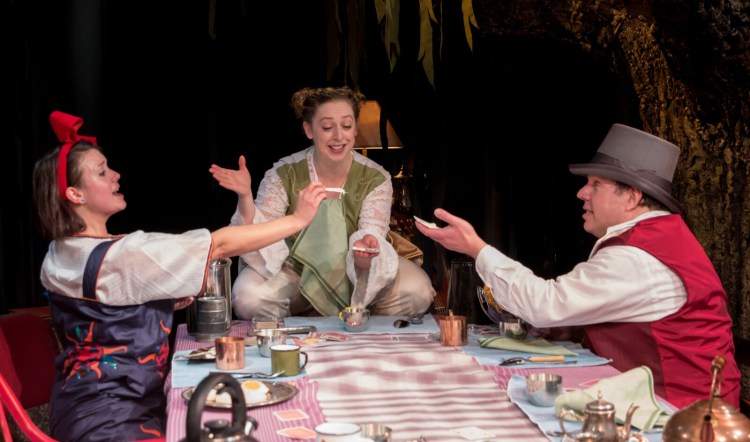The latest production from Mad Horse Theatre is chaotic, noisy and seems unaware of what it’s about. So it shouldn’t be surprising that “Waiting for Alice,” a wildly imaginative play in its world premiere, relates so well to contemporary life.
Inspired by the edgy plays of writers like Samuel Beckett and Eugene Ionesco and the quirky visions of surrealist artist Salvador Dali, not to mention the thoughts of youngsters the author worked with at the Children’s Museum and Theatre of Maine, burgeoning playwright Allison McCall came to think about what might have happened before the titular guest arrived at the Mad Tea Party in Lewis Carroll’s “Alice in Wonderland.”
The Mad Hatter, March Hare, and Dormouse ponder who this Alice they are expecting really is and when she will arrive. Or has she already been there and left? Or is she waiting for them? And what is an Alice, anyway? All along, the Cheshire Cat adds bits of insinuating skepticism to further raise the level of anxiety.
Director Chris DeFilipp has assembled McCall’s strangely sympathetic cast of characters around, on top of, and underneath a tea table full of cups and pots and assorted small delectables and situated it next to a highly climbable tree (design by Connor Perry).
An initially wacky but increasingly dire sense of suspense about what’s “beyond the table” builds in this 90-minute play (with no intermission) as all the questions, asked but not answered, force the action to reach toward a point of frenzy.
The Mad Hatter (Zack Handlen), and March Hare (Marie Stewart Harmon) begin the dialogue in an on-again, off-again (and occasionally too loud for the intimate performance space) riddling debate leavened by their practice of ceremoniously returning to sit and sip at the recurring six o’clock teatime.
Soon joined by the storytelling Dormouse (Kat Moraros) and the wily Cheshire Cat (Tyler Costigan), questions about whether their collective rituals constitute a sort of trap, or a comforting salvation, stir them to broad physical races and chases and a good deal of linguistic gymnastics. Their laughable actions increasingly meld with a screeching desperation.
A bouncy Harmon provides a good deal of the wide-eyed, childlike innocence while Handlen, known for his success in off-kilter roles, embodies the “wisdom” of a flaky elder. Moraros waxes hilariously poetic in reciting absurd lines from Carroll’s “Jabberwocky” and Costigan effectively transforms his cat from menace to friendly feline.
All four characters eventually make their way to a sort of tentative conclusion that keeping together is important.
Not a bad message for these times from this adventurous and entertaining new play.
Steve Feeney is a freelance writer who lives in Portland.
Send questions/comments to the editors.


